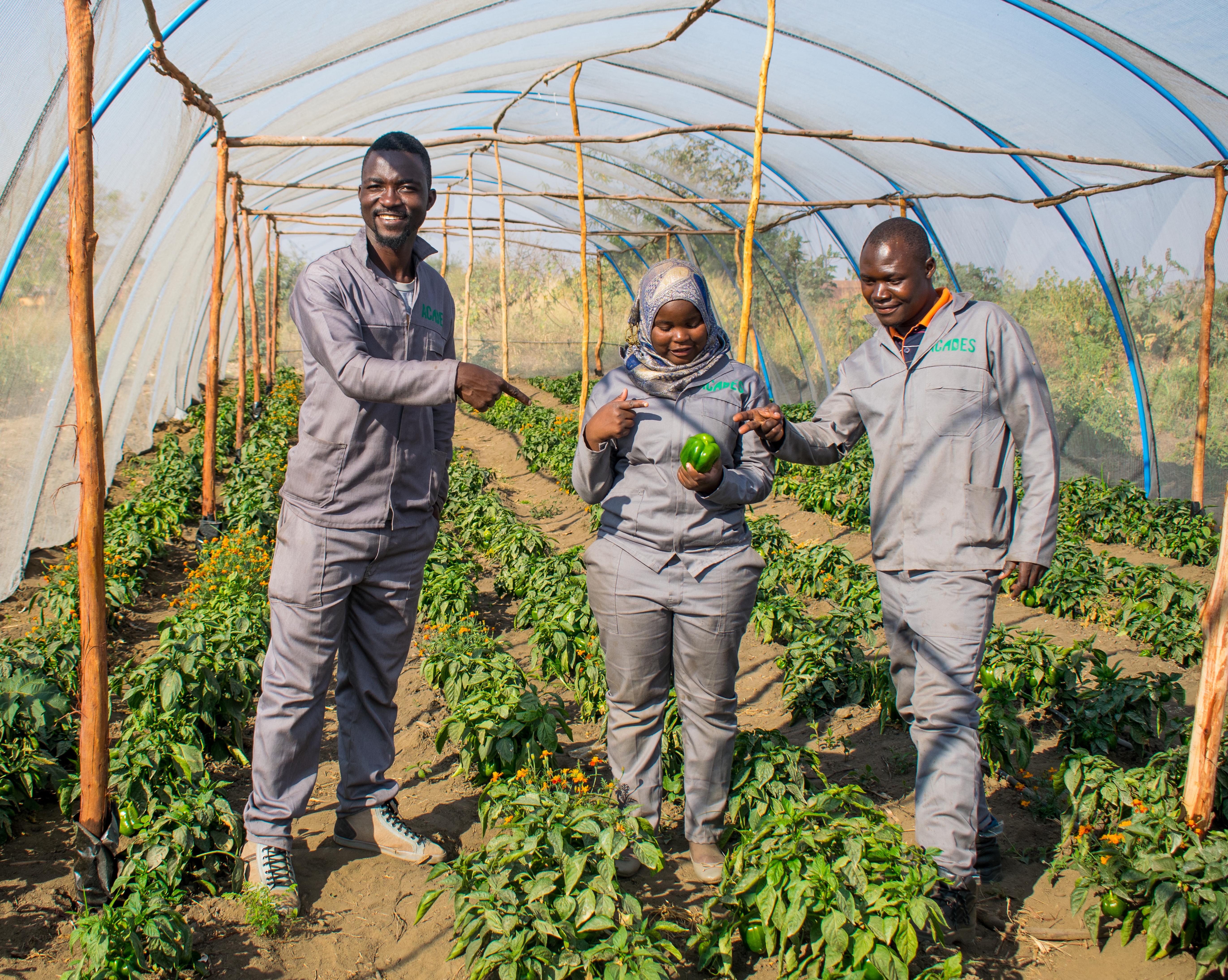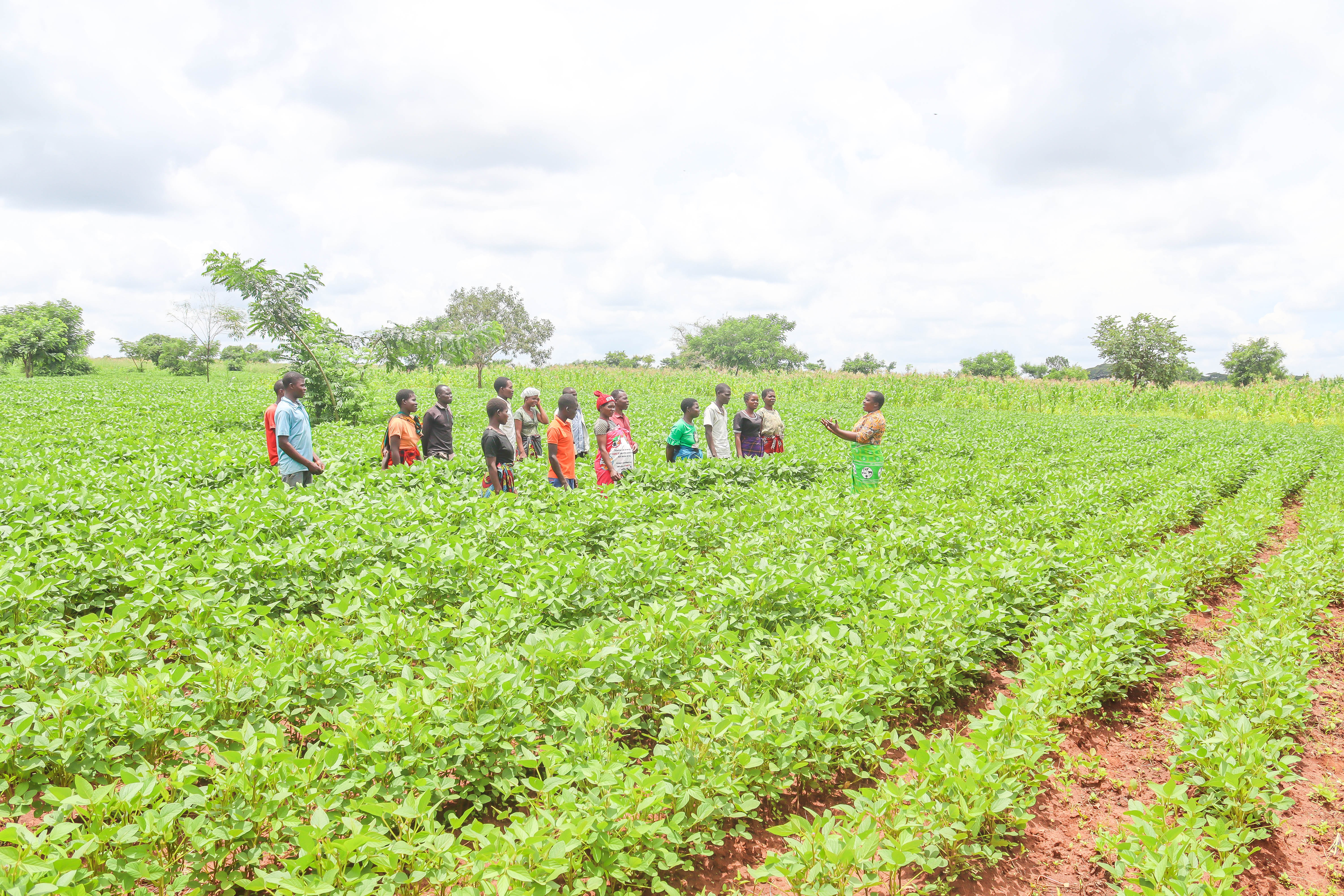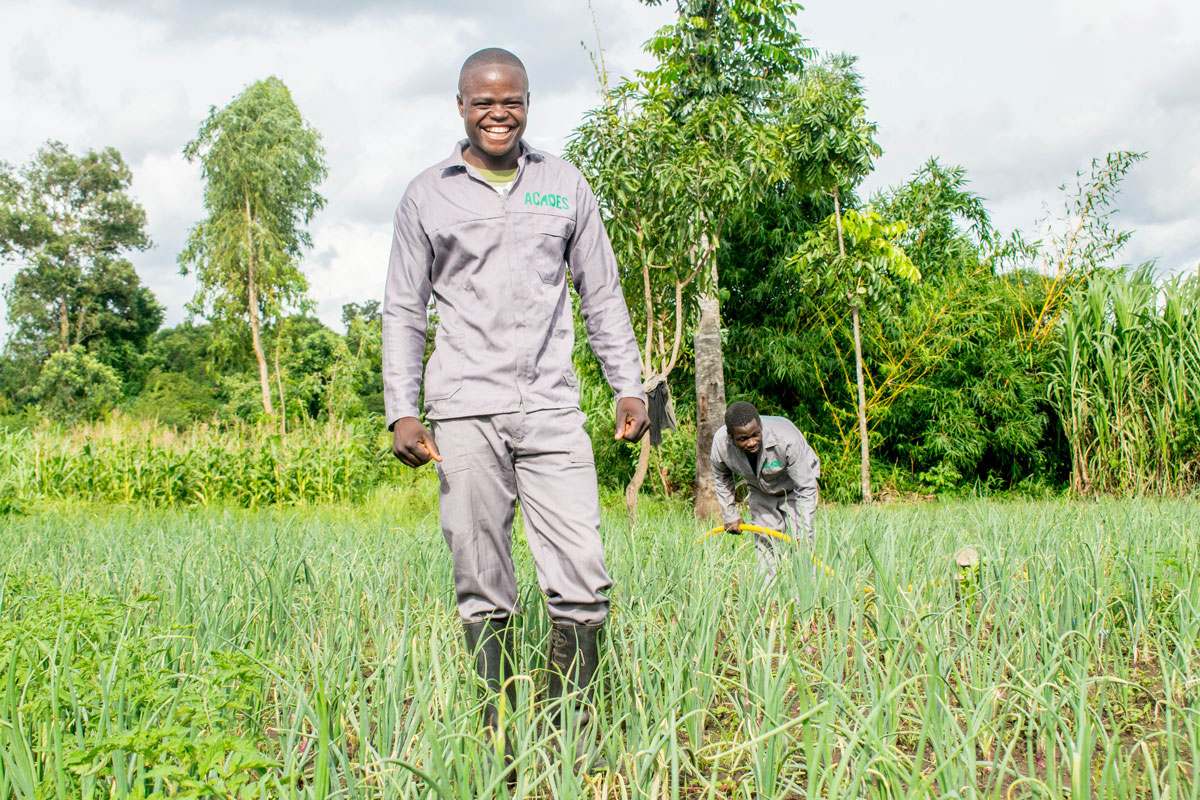Hastings Nhlane
Founder and CEO, ACADES
Fellow project website: www.acadesmw.com
Hastings has made agriculture once again a viable, attractive career option for young people.

THE NEW IDEA
70 percent of Africa’s 1.3 billion people live in rural areas. Here agriculture remains for most the only real way of making a living. It is also critical to feeding the growing African population.
Hastings is making farming a viable and appealing career path for young people in Malawi and beyond. He pro-vides tailor-made technical advice on agriculture and the business of farming to start-up young farmers. Through his organization ACADES, Hastings helps young people establish productive smallholder farms, then unite to improve their productivity and increase their income. He is helping drive a significant change of attitude in Malawi, where farmwork is seen as an occupation of last resort, associated with poverty and hard labor. Hastings is generating real economic prospects in rural areas, where 80 percent of the population lacks access to formal employment options that can adequately support their livelihoods and food security.
Hastings’ organization ACADES helps young people overcome multiple challenges, or barriers to entry into farming. First, it provides training in soil and water management, agribusiness, routes to market, and the like. Then ACADES’ own microfinancing arm helps with inputs and early loans, so young farmers can get established and build credit. It then connects them to profitable mar-kets, where they can sell their products at fair prices.
ACADES has developed a thriving community of small-scale young farmers, enabling them to create employment for themselves and others. So far ACADES has reached 6,900 direct beneficiaries, trained 2,625 farmers, and organized 64 new farmer groups.
ACADES has been identified by the Food and Agriculture Organization of the UN as having the best approach in Africa to strengthening youth employment creation through agriculture. ACADES received the Presidential Zikomo Award from the President of the Republic of Malawi for its outstanding work in creating economic opportunities for rural communities.

"ACADES is making agriculture a viable option for rural youth employment creation and creating economic opportunities in rural areas where 80% of people do not have access to formal employment opportunities to support and sustain their livelihoods.”
-African Visionary Fund
THE PROBLEM
Young people account for 60 percent of the unemployed on the African continent, and there is an urgent need to create work and livelihoods for them in line with population growth. In Malawi, 75 percent of the population is younger than 35, according to the Malawi Population Census Report of 2018. The same report projects that Malawi’s population will grow by 35 percent in the next five years.
Despite high unemployment rates, many young people in Malawi and in Africa generally perceive agriculture as an activity for the old and poor, offering only low income and low status. They have grown up seeing farmers in their communities live in poverty and have limited exposure to other role models in agriculture. Additionally, most youth are only familiar with traditional and low-value crops such as maize. Most Malawian families want their children to move to cities when they are grown and find formal employment. The idea that farming is a terrible fate is so engrained that teachers often threaten students that if they don’t work hard in school, they’ll become farmers.
There are also many practical barriers that make enter-ing farming challenging. Young people tend to have low financial literacy, no savings or credit history, no experience keeping business records and aren’t organized in groups, all factors that hinder them from accessing essential support services. Young farmers are seen by financial institutions as risky clients, making it hard for them to get the capital to purchase inputs.
While there are some programs aimed at addressing youth unemployment, most focus on the promotion of technical, vocational, and entrepreneurial activities, mostly in the traditional trades (e.g. carpentry, plumbing, electrical installation, etc.). These programs are implemented primarily in urban areas, not disconnected rural communities. And they do not focus on agriculture as a sector that can create good jobs for young people.
The few agriculture programs that do target young people are not comprehensive enough to ensure sustainability. They focus on things like training and markets but fall short in transforming the negative mindset that rural youth have towards farming. Existing interventions and government extension programs stress financing for seasonal production, but not beyond that season or that program’s duration, providing no long-term aid or guidance. Supporting youth in agriculture is seen as risky and unattractive to most stakeholders and service providers. Consequently, most youth in agriculture engage in farming as an activity of last resort and are looking for ways to exit the profession.
THE STRATEGY
ACADES attracts young people into farming by changing their mindset and reducing risk, through youth-to-youth empowerment programs, a community-led approach, and strategic partnerships.
At its inception, ACADES partnered with the Ministry of Youth, which already had existing youth structures in villages for health promotion purposes. The first youth collectives for agriculture were recruited from these groups. ACADES collectives consist of self-selected young people who chose their own group leaders. ACADES’ only stipulation is that there is equal representation by gender among the leadership, as often men seek and occupy these roles. The collectives are structured as informal savings groups. Some participants have bank accounts; others in more remote locations use mobile money. Training ensures the youth farmers develop necessary skills, covering themes around modern production, climate-smart agriculture, soil and crop management, water management, agribusiness, and financial literacy, so that they can increase their productivity and sustain their production resources. After training, ACADES offers the collectives loans in the form of inputs to get their farming endeavors going. All these measures are important, given that previously unemployed youth are starting up with little prior training and no experience in agribusiness. They ensure that young farmers have sufficient know-how to produce good yields, 40 percent of which are for household consumption. The other 60 percent are cash crops such as soybeans and rice that enable these new farmers to, among other purposes, pay back the loans from ACADES. As ACADES has grown and news about its work and success has spread, more groups are approaching the organization independently to join its programs.

"I am really impressed with the project I visited here at ACADES. These youths have created jobs for themselves, and they are able to work with local people.” – World Bank Country Director for Malawi
- Nyasa Times
To overcome the challenges of access to finance, in 2022 ACADES started its own microfinancing institution, wholly owned by ACADES Foundation. As the new farmers are young and have no credit record, ACADES provides tailormade loans and loan products, including certified seeds, fertilizers, inoculants, farming implements, and irrigation equipment. These high-quality inputs, productive assets, and advanced technologies enable rural small-scale farmers to quickly increase their productivity and therefore their income. This reduces the “risk” to farming and makes it easier for young people to get access to future financing, by demonstrating creditworthiness. So far, ACADES has a loan book value of about 230,000 USD. The average loan is 46 USD, and only six percent of borrowers default. When there is a default, it is carried to the next planting season and is a group liability; therefore, the groups reinforce collective responsibility. To date ACADES has provided over 5,000 input loans.
"The beauty of this initiative is that it is directly complimenting the government’s development agenda, in line with Malawi 2063, in ensuring food security, job creation and wealth creation.”
The World Bank
To further influence the way other financial institutions fund small farmers, ACADES is part of the Malawi Micro-finance Network, where it promotes loan products for youth farmer collectives. As ACADES is the only institution that invests in young farmers, Hastings hopes to influence other lenders to expand their loan portfolios to include young farmers, based on their success and the tools ACADES has created (e.g., for record-keeping of income, expenses, sales and loan contributions) that can provide alternative ways to verify creditworthiness.
To bridge the lack of markets for small-scale farmers, ACADES brings ethical buyers who will pay fair-market prices to its farmers in very rural areas. This reduces risk, in addition to enabling its borrowers to make more money from their hard work. ACADES has established market centers in all its farming communities, where farmers sell their produce and get fair prices for their commodities. As these young farmers make more money, they are able to reinvest it in their business. ACADES has also connected its farmers to international markets, participating in the Intra African Trade fair in Durban, South Africa and the Lusaka Business Indaba in Lusaka, Zambia.
"When I saw ACADES and what they were doing with agriculture, I thought it was a perfect organization for us to partner with. I saw that they’re doing something that has the potential to help the country as a whole.” – Lusayo Mwakatika, Former President of Project Malawi at the University of Wisconsin
The Badger Herald
Its model has positioned ACADES as an organization of influence in promoting youth economic empowerment through agriculture in Malawi and Africa. Hastings is vice-president for the regional farmers’ body South Af-rica Confederation of Agricultural Unions. ACADES is part of the core advisory panel for Malawi Vision 2063 and is involved in designing country strategy papers for bilateral organizations including the German Development Corporation and the government of Flanders.
This places ACADES in a unique position to influence policy and resources targeted at supporting youth participation in agribusiness. ACADES also contributes to the core advisory panel on youth for Malawi’s National Planning Commission, as well as its Ministry of Gender, to break down cultural barriers which hinder women from participating in the agricultural sector.
ACADES has now scaled to five districts in Malawi and aims to grow to all 12 rural districts there, with the goal of creating 500,000 youth farmers in that country in the next five years and creating one million agriculture-related jobs for rural youth throughout Africa. ACADES plans to expand to three new countries – Tanzania, Zambia and Zimbabwe – by 2025. Their growth strategy is to scale the idea through partnerships. The demand for learning visits with ACADES farmers is growing, especially after the UN Food and Agriculture Organization named it the best model to create opportunities for youth in agriculture. To date Hastings has hosted learning visits from organizations in Kenya, Tanzania, Uganda, South Africa and Zambia, focused on sharing the ACADES model and how it can be adapted to other African countries.

THE PERSON
From early in life, Hastings has been exposed to the difficulties faced by the agricultural sector in his country. He grew up wanting to be a teacher, as these were the well-to-do people in his community. Watching farmers struggle to make ends meet in his community made farming an undesirable career option for him. After graduating from high school, he wanted to study engineering but was not granted his first choice and ended up studying agriculture at the Lilongwe University of Agriculture and Natural Resources. In his first year he was determined to change his degree, but as he started gaining a better understanding of agribusiness, he grew to love agriculture. During his days as an active student leader, he attended a talk that challenged him to reflect on how he could lead the change he wanted to see in agriculture. Upon graduating, he tried his hand at commercial agriculture by farming onions. He experienced firsthand the challenges young people face with owning land and farming when his uncle repossessed the land he was farming on, after seeing that he was starting to make a success of it. This sparked in him the urge to resolve the problem for other young people who might be facing similar difficulties, and he approached the Ministry of Agriculture to allocate land for young agriculture graduates to farm. After many months of persistence, he was allocated 100 hectares of virgin land, but the land proved difficult to work in. He and his fellow young farmers approached over 12 institutions to support them, all of which declined, citing their youth as a risk making them unsafe to invest in. Hastings was not deterred and continued trying to find ways to innovate for young people. He was gifted 6 hectares of land by his university professors, and this laid the foundation for ACADES.